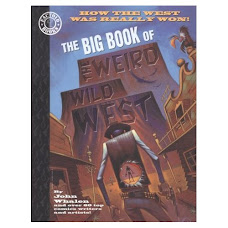 Louisiana writer Randy Denmon surprised many members of the Western community when apparently out of the blue his debut title The Lawless Frontier
Louisiana writer Randy Denmon surprised many members of the Western community when apparently out of the blue his debut title The Lawless FrontierSet during the Mexican Revolution, The Lawless Frontier pits two U.S. war veterans and partners-in-arms of the Spanish-American War into the heart of the bloody conflict south of the border. The taciturn, half Mexican, half Texan attorney Stewart Cook asks his former comrade Myles Adams, now a liaison officer for the U.S. War Department, to accompany him to Mexico for a most fateful mission: rescue his romantic interest Alexia García and her family before the rebel troops of Pancho Villa ravage her hometown. The enterprise’s prospects for success pale compared to the chance that the two men will make it out alive. And yet, before one thinks he is faced with the typical Western yarn where the adventurers beat insurmountable odds and outshoot every bandit in sight, Denmon starts to weave a far more ambitious tale.
Adams and Cook are the unwitting witnesses of a vicious strife in a foreign yet neighboring land. Through their eyes the reader sees the plight of refugees leaving their towns before they are pillaged as anarchy encroaches the country. Through their interaction with other characters, Denmon also alludes to the Wilson administration’s hesitancy to intervene in the conflict, reflecting on the nature of foreign entanglements and drawing interesting parallels between past and present.
Although they have experienced war fighting in the Philippines and both of them are skilled soldiers, Adams and Cook are not the larger than life individuals you would expect in a novel with this title and presentation (allow me a little digression here, but this is yet another commentary on how publishers stubbornly insist on marketing Westerns as if they were assembly line products, clichéd titles and derivative cover illustrations included. For more on this, check out our interview with Randy Denmon on Wednesday).
In spite of his inexpressive nature, Stewart is often scared and feels doubts about the success of the mission. He has yet to express Alexia his feelings for her and yet he is marching across Mexico in a time and place where being an American is not only unpopular but dangerous. Myles, on the other hand, is a happy-go-lucky character who nevertheless excels at leading men through perilous situations. The rapport between Cook and Adams is reminiscent of that between Larry McMurtry’s Woodrow Call and Gus McCrae as their complementary personalities help them march on.
If I could mention a minor quibble with the novel, it is one that in all likelihood is more the responsibility of its editors than of the author himself. As in many other Western novels, its use of Spanish is at times erratic and grammatically incorrect, something that while not critical to the story still undermines its authenticity. To witness, the references to the “Santa Catarina” river near Monterrey as the “Santo Catarina” river (p. 162) or the unlikely choice of name for one of Alexia’s sisters: “Alijondra” (nonexistent as far as I know) instead of the more plausible “Alejandra.”
The Lawless Frontier is a solid first effort that, not unfairly, has earned accolades from a Western great like Elmer Kelton as well as National Book Award winner Tim O’Brien. Although it is uncertain whether Denmon will continue writing Westerns (or novels that could conceivably be marketed as such) he is a writer that merits close attention.
(Watch out for a Saddlebums interview with Randy Denmon on Wednesday)

1 comment:
I had never heard of the novel before but I guess I'll give it a try. Thanks again for a good review.
Post a Comment